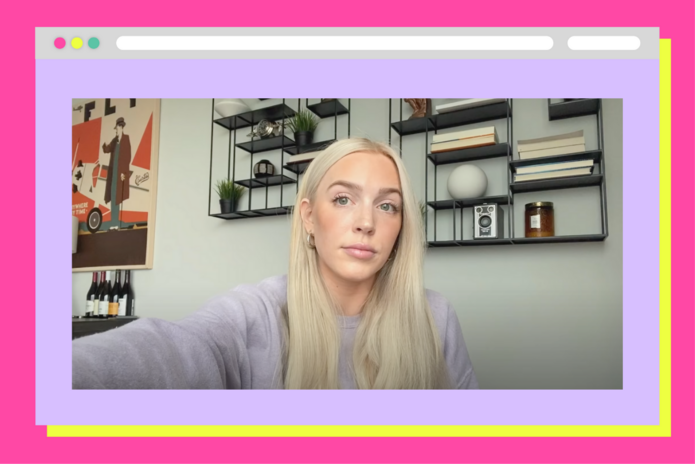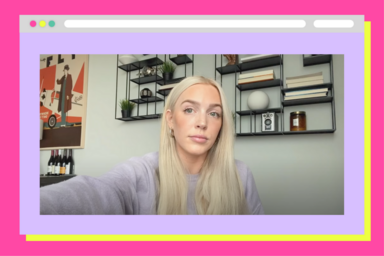I first heard about the Call Her Daddy podcast because of the now-infamous contract drama. If you don’t know, Alex Cooper and Sofia Franklyn, the two original hosts of the podcast, had a falling out over their contract with Barstool Sports a little over a year ago. There are more twists and turns to it, but ultimately, Sofia left the podcast (she now runs her own podcast, called Sofia with an F) and the former besties haven’t spoken in over a year. Since Sofia’s departure, Call Her Daddy is almost unrecognizable, but in the most subtle way. It has the same tone and similar content, but it advocates for something totally different. As someone who really likes what Call Her Daddy is doing now, I can’t help but wonder: how did this 180 happen?
During the height of quarantine, I was excited to have a new internet spectacle, even between two podcasters I had never heard of. I watched Alex’s 34-minute “The Truth About Call Her Daddy” tell-all and found myself falling deeper and deeper into the conflict, memorizing every detail and accusation. I learned code names like “suitman” and was introduced to Alex’s blunt yet funny yet inappropriate style for the first time. After days of forcing my friends to have an opinion on the issue, I figured it was time that I listened to an episode of the podcast that was the object of my fixation.
I had always been skeptical of Barstool Sports, which is the platform that, until a few weeks ago, owned Call Her Daddy. Everything about Barstool seemed not for me. It was vaguely Republican, marketed toward men, and I was pretty sure I had heard accusations of racism and misogyny (which research later substantiated), but I reluctantly pressed play on a random Call Her Daddy episode. It did not go well. No matter how I tried to rationalize it, Call Her Daddy was hardly feminist, even though it sometimes thought of itself as subversive and empowering.
Call Her Daddy was hardly feminist, even though it sometimes thought of itself as subversive and empowering.
It was entertaining, and very explicit, but I couldn’t make it through an entire episode. “If you’re a 5 or a 6, die for that d*ck,” “cheat or be cheated on,” “you’re just a hole” — that’s the kind of dating advice Alex and Sofia were sharing, and I had a feeling it was more for Barstool’s mostly male fanbase than for the women who genuinely sought self-improvement.
Though I was Call Her Daddy-curious, I realized it wasn’t the podcast for me, and a lot of this had to do with the podcast’s starting place, Barstool Sports. While Alex is not one to criticize Barstool and has a positive relationship with the outlet, early Call Her Daddy episodes are symptomatic of Barstool’s notoriously bro-y, politically incorrect (read: misogynistic) nature. After she and Sofia sought to renegotiate with Barstool and Sofia’s ultimate departure, Alex had even more freedom to set the rules for Call Her Daddy, and the result was a very different podcast.
In redesigning her podcast as a solo act, Alex made some critical changes. Her show became more interview-based, and the world learned that Alex Cooper is a really good interviewer. By the time Alex interviewed Miley Cyrus, I was on board, quietly considering myself part of the “Daddy Gang.” She’s brought on guests including sex therapist Emily Morse, Mia Khalifa, and Holly Madison. She interviews them in the way that only Alex can, asking really blunt (and yet really sensitive) questions about their sexuality and whatever else is on her mind — usually about whether or not they go to therapy.
The trajectory of Call Her Daddy, in many ways, is typical of any post-grad’s life.
At first listen, the “single father era” of Call Her Daddy doesn’t sound so different from its earlier stuff. There are X-rated stories and bold tips and tricks, but it feels like Alex’s overall outlook has changed. Call Her Daddy is no longer about following rigid (and archaic) rules in order to successfully win over the attention of men, but rather, it’s about doing whatever the heck you want. It’s about having honest conversations and creating a space where people can talk about sex in ways they hadn’t before.
In a newer episode called “How I Glucked My Way to the Top,” the changes in Call Her Daddy’s mindset were on full display. “Oh, have times motherf*cking changed,” Alex announced as she went on to encourage listeners to be unapologetically themselves, even reversing her stance on high-waisted bathing suit bottoms — a very welcome shift from the days when her podcast left me wondering… am I a 5 or a 6? While interviewing one of her heroes, Chelsea Handler, in her first episode exclusively on Spotify, Alex asked if Handler stands by everything she’s said, indicating that she had been asking herself the same question. Ultimately, she expressed a desire to revisit some of her old advice on future episodes, and reverse course on some of Call Her Daddy’s most memorable moments.
The trajectory of Call Her Daddy, in many ways, is typical of any post-grad’s life. Alex, now 26, grew up a little, she changed her stance a lot, and expanded her view on what is acceptable — all while maintaining the same funny and confident personality fans have always loved. This is why, despite the changes, Alex isn’t losing fans, but gaining them. I can’t say that I agree with everything Alex says and does, nor can I say that she’s a feminist icon, but that’s not the point. The point is that it’s exciting to have another person on the internet trying to share something positive and fun (and even sexy).
I can’t say that I agree with everything Alex says and does, nor can I say that she’s a feminist icon, but that’s not the point.
While the days of “cheat or be cheated on” are over, the best days of Call Her Daddy are just beginning. Alex just signed a $60 million deal with Spotify and she currently has the number three podcast on the Spotify Charts. This is one of the biggest podcasting deals of all time, and even landed her a profile in the Wall Street Journal, just another element of Call Her Daddy that feels like a 180 from its origins. Alex hasn’t addressed her past beyond side comments during interviews, but I do hope she talks more about it in the future. Though the changes to Call Her Daddy alone show us a lot about what it means to grow, it can’t hurt to talk about where she came from and why she doesn’t feel that way anymore.


